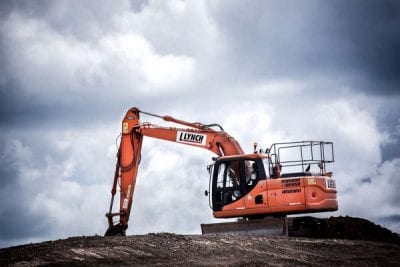As you can tailor asset tracking software to your industry and use case, if you’re in the construction industry, you can benefit from a suite of features including equipment booking capabilities and location tracking.
Overall, construction equipment tracking software helps save you time and money by improving your operations.
Which Industries Can Use Asset Tracking Software?
In other words, if a company wishes to track their office’s assets, they can use the system as an IT asset management software and as a fixed asset register software.
Why is this relevant to construction? As the construction industry has one of the biggest overlaps in terms of asset tracking needs. Construction companies will have equipment, tools, IT assets and fixed assets, and all must be tracked effectively.
This is why it’s helpful to note that asset tracking software can be used in any industry, as the ways many industries use the software are applicable to a construction equipment tracking use case.
Using Asset Tags To Track Tools And Equipment
Every time you scan an asset’s tag, the asset’s last seen location updates, the user who scanned the tag is logged and a timestamp is created. This gives you a full audit trail of your asset interactions.
Getting A Return On Investment From Asset Tracking Software
An accurate asset register also minimises the chance of duplicate purchases or other common mistakes. Then, the improved audit trail you get from tracking your assets means that you’re less likely to lose them.
Then, there are the other benefits you get from the speed you can track assets with. In other words, asset tracking software gives you free time as you save time doing critical operations.
This time can be spent on other things, now, and doesn’t need to be dedicated towards double, triple, and quadruple checking an asset register.
Further Asset Tracking Capabilities
You can use many helpful features to automate asset location tracking and to log wherever your assets are on or off site. Then, you can run speedy audits on your assets thanks to dedicated tagging features.
Maintenance is simplified through an effective reminders system and the ability to log reactive issues, notifying your team at any moment if a problem needs to be addressed.
Then, you can track who has what further by using an effective equipment checkout system. This system allows you to monitor, log, and indicate who has which asset and when they’re unavailable.
itemit gives you all of these features and more. With itemit, you save time and money on your construction equipment tracking, which is why it’s used by construction firms across the world.
To find out more about how itemit can help you, you can contact the team at team@itemit.com or fill in the form below to start your very own 14-day free trial – no strings attached!
Asset Tracking Software
Choose a better way to track your assets
Start your free 14-day trial now
Instant access. No credit card details required.
You can also start your 14-day free trial by filling out the form below, or you can contact us at team@itemit.com or at 01223 421611.
Or, you can check out these blogs:
What Are the Best Asset Management Tracking Tools?
3 Ways Fixed Asset Tracking Software Saves you Time and Money
How to Track Maintenance with Heavy Equipment Maintenance Software
Latest posts
itemit Blog
Tips, guides, industry best practices, and news.
Latest posts
itemit Blog
Tips, guides, industry best practices, and news.
Related articles
How Inventory Financing Can Improve Asset Tracking Efficiency
Learn how inventory financing enhances asset tracking efficiency, streamlining operations, boosting cash flow, and improving inventory management for your business.
How PUWER Inspections Enhance Asset Management Efficiency
Discover how PUWER inspections improve asset management efficiency by ensuring compliance, reducing risks, and enhancing equipment safety.
PUWER Equipment Compliance: What’s Covered and Required
Discover what equipment is covered by PUWER, why it matters for workplace safety, and how compliance ensures effective asset management. Read more!



